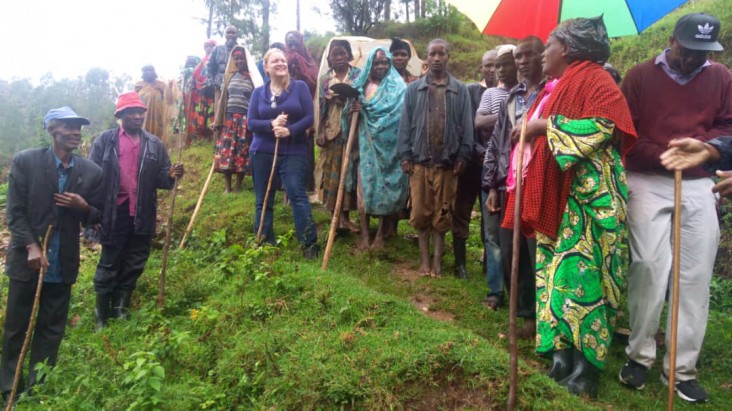Speeches Shim

USAID Staff in Action Against COVID-19
For too many families in Uganda, every month is a struggle to survive. There may be just enough money today to put food on the table and clothe the children, but if something goes wrong—an unexpected illness, the loss of a job, a natural disaster—then a family can suddenly find itself unable to cope. One of USAID’s main goals in Uganda is to promote resilience. That means improving a household’s ability to withstand, mitigate, and recover from unexpected shocks.
USAID’s Integrated Community Agriculture and Nutrition Activity, or ICAN, is designed to do just that. Since 2018, it has been working with eight districts in southwest Uganda, northern Uganda, and Karamoja. In the southwest, the activity helped farmers control massive flooding by creating terraces and planting bamboo to prevent landslides; during a malaria outbreak in Acholi, ICAN helped connect communities to health workers and developed a network of businesses and care groups to deal with the broader consequences of malaria, such as malnutrition.
The COVID-19 pandemic has caused unprecedented changes globally. For USAID, the pandemic has meant adapting our short-term programming and quickly changing how our workforce manage their programs.
When COVID-19 began making headlines, Dr. Tor Edwards, USAID/Uganda’s Resilience and Nutrition Lead, took notice and began preparing. Although COVID-19 wasn’t anticipated when the ICAN activity was designed, responding to unexpected shocks like this pandemic and building community resilience is exactly what ICAN was designed to do. Dr. Edwards and her team, working with local partners throughout Uganda, queried community groups about their needs should the country go into lockdown. Through collaboration with USAID’s major health programs, Dr. Edwards and ICAN learned about what would happen if COVID-19 spread to specific regions, what resources would be available, and what community needs would likely be.
In March, Uganda began its lockdown, and ICAN’s systems were tested and proved to be strong. USAID’s local partners, such as the Children of the World Foundation and Caritas Kabale, among others, had already established deep connections with local leadership to respond to disasters, and their activities quickly pivoted to respond to COVID-19.
Messages about proper handwashing and social distancing were integrated into ongoing nutrition messaging that is regularly shared via radio and community groups. Mobile vans spread information about how people could protect themselves and their loved ones. Because ICAN’s services were recognized as essential, district leaders didn’t hesitate to give them permission to continue visiting their partners and beneficiaries after private vehicles were banned from the streets. “Even before the restrictions, we made our village groups smaller, so that instead of having one group of 25, there would be three meetings with eight people, and then later groups of five,” Tor says.
ICAN staff also conducted surveys of what goods were still available at local markets. As Tor explained, if COVID-19 were to arrive in Kitgum, “we don’t want to send people to get equipment that isn’t there.” In the meantime, ICAN has been leaning on its relationships with businesses to prepare for the disease. After working with a number of women to start small businesses making soap, for example, ICAN is now encouraging them to increase production and set up washing stations in key public places such as schools. Seamstresses are being trained to make face masks. Pharmacists have been given lists of the most crucial items to keep in stock.
From her home in Kampala, Dr. Edwards manages to keep a close eye on these far-flung activities. “We’re still doing our work, just with some changes.” She still meets weekly with the ICAN teams, albeit by teleconference now. These meetings have been opened up to allow other donors to participate, allowing all groups to better coordinate and learn from each other.
“The main point is to build up the community. We are helping them react through their own means so it doesn’t come down to humanitarian aid later.” Dr. Edwards stresses that ICAN isn’t just reacting to COVID-19. ICAN’s activities are part of larger USAID assistance programs meant to weather this crisis and to support the Ugandan people in building a stronger economic foundation throughout Uganda, supporting Uganda on its Journey to Self-Reliance.

Comment
Make a general inquiry or suggest an improvement.